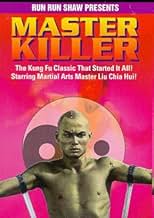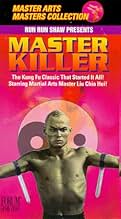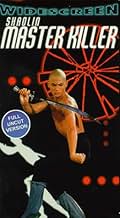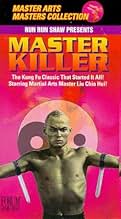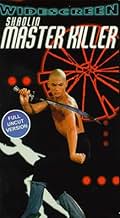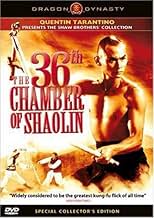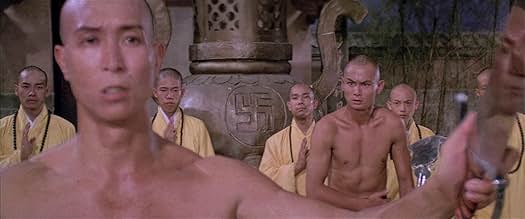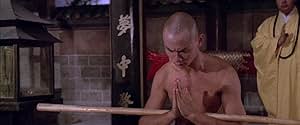AVALIAÇÃO DA IMDb
7,6/10
19 mil
SUA AVALIAÇÃO
San Te, um civil fugindo dos opressores oficiais manchus, refugia-se em um templo Shaolin, onde se dedica ao mais rigoroso treinamento de kung fu.San Te, um civil fugindo dos opressores oficiais manchus, refugia-se em um templo Shaolin, onde se dedica ao mais rigoroso treinamento de kung fu.San Te, um civil fugindo dos opressores oficiais manchus, refugia-se em um templo Shaolin, onde se dedica ao mais rigoroso treinamento de kung fu.
- Direção
- Roteirista
- Artistas
- Prêmios
- 1 indicação no total
Lo Lieh
- General Tien Ta
- (as Lieh Lo)
Yue Wong
- Miller Six
- (as Yu Wang)
Liu Chia-Yung
- General Yin
- (as Chia-Yung Liu)
Norman Chu
- Lu Ah-Tsai
- (as Shao-Chiang Hsu)
Yung Henry Yu
- Hung Hsi-Kuan
- (as Yang Yu)
John Cheung
- Lord Cheng
- (as Wu-Liang Chang)
Wilson Tong
- Tang San-Yao
- (as Tang Wei-cheng)
Hoi-Sang Lee
- Abbot of Justice Office
- (as Hai-Sheng Li)
Kwok-Choi Hon
- Lin Chen
- (as Kuo-Tsai Han)
Avaliações em destaque
for some eight years, Liu Chia Liang worked as martial arts choreographer at shaw bros., especially with legendary director Chang Cheh, from whom Liu clearly learned mise-en-scene, as the french call it - a director's skill in using camera, editing and theme to move from one dramatic episode to another. in turn, Liu tried to show Chang Che the possibilities inherent in traditional kung fu, but to little avail - Chang Che really always thought himself a maker of action-adventure films, not primarily a martial arts director. so Liu began making his own films at shaw bros., and demonstrated what he learned from Chang Che, while developing his own themes concerning the the traditional arts we've come to call kung fu.
one decided difference between Liu and Chang - indeed, between Liu and most of the other shaw bros. directors of the period - is that Liu believed that if the fundamental message of kung-fu - which is really about good health and spiritual growth - is to be carried over to the audience, the arts involved would need to be presented in as realistic a fashion as possible - no wire works, no unnecessary leaping over walls, no mythical 'iron fist' technique of jamming one's hand through someone's chest. and once that decision was made, clearly it would also be necessary to develop plots and characters as equally realistic, or the effort would be for nothing.
Liu's movies are thus 'about' kung fu in the purest sense; they are not about fighting, but about discipline. they are not about revenge, they are about using one's training to get beyond revenge.
although the heavy tone of this film obscures it a little, the fact remains that the characters in this film are all very believably human in a way that Chang Che's characters never were. and they don't learn their skills all that quickly - the time frame of the shaolin episode is at least three years - but by doing the same excersizes over and over again until they are perfectly comfortable with them. at which point, of course, they can perform with almost no show of effort.
by the way, there are documentary films of real performances of real shaolin monks demonstrating real martial arts - Liu is pretty close to the real thing, here.
Liu, by the way, appears to be the son of someone who trained with lam sai wing - aka 'butcher' wing, but in no way the country bumpkin he's sometimes made out to be, as in yuen woo ping's 'magnificent butcher'. lam sai wing studied with the legendary Wong Fei Hong, who was taught not only by his classically trained father, but by a well-known former shaolin monk - in short, the Liu credentials are rock solid.
Gordon Liu, star of the film, is Chia Leung's adoptive brother. he is probably the finest performer of traditional kung fu ever filmed, bar none, and utterly fascinating to watch. he also does a solid piece of acting in this film, as well.
shaw bros. quality, Liu bros. skill - don't ask, just see it.
one decided difference between Liu and Chang - indeed, between Liu and most of the other shaw bros. directors of the period - is that Liu believed that if the fundamental message of kung-fu - which is really about good health and spiritual growth - is to be carried over to the audience, the arts involved would need to be presented in as realistic a fashion as possible - no wire works, no unnecessary leaping over walls, no mythical 'iron fist' technique of jamming one's hand through someone's chest. and once that decision was made, clearly it would also be necessary to develop plots and characters as equally realistic, or the effort would be for nothing.
Liu's movies are thus 'about' kung fu in the purest sense; they are not about fighting, but about discipline. they are not about revenge, they are about using one's training to get beyond revenge.
although the heavy tone of this film obscures it a little, the fact remains that the characters in this film are all very believably human in a way that Chang Che's characters never were. and they don't learn their skills all that quickly - the time frame of the shaolin episode is at least three years - but by doing the same excersizes over and over again until they are perfectly comfortable with them. at which point, of course, they can perform with almost no show of effort.
by the way, there are documentary films of real performances of real shaolin monks demonstrating real martial arts - Liu is pretty close to the real thing, here.
Liu, by the way, appears to be the son of someone who trained with lam sai wing - aka 'butcher' wing, but in no way the country bumpkin he's sometimes made out to be, as in yuen woo ping's 'magnificent butcher'. lam sai wing studied with the legendary Wong Fei Hong, who was taught not only by his classically trained father, but by a well-known former shaolin monk - in short, the Liu credentials are rock solid.
Gordon Liu, star of the film, is Chia Leung's adoptive brother. he is probably the finest performer of traditional kung fu ever filmed, bar none, and utterly fascinating to watch. he also does a solid piece of acting in this film, as well.
shaw bros. quality, Liu bros. skill - don't ask, just see it.
This is THE Hong Kong martial arts movie every fan of the genre MUST see. After watching this you'll be in no doubt why Tarantino picked the star, Chia Hui Liu, for two parts in his Kill Bill double.
The Shaw brothers demonstrate their mastery of the martial arts movie in this 1978 classic. Following the fortunes of a young rebel as he escapes from the tyranny of the government to a Shaolin temple where he hopes to learn superior kung fu techniques, we see his development from an inexperienced boy to an unrivalled master.
It is wonderful to see the rigours of training in each 'chamber'. The water crossing scenes are a delight. And some of the pain these students go through to perfect their bodies and art is impressive indeed.
I cannot recommend this enough. Indeed everyone should attempt to snap up any Shaw Brothers movie from around that period. "The 36th Chamber" stands head and shoulders above the rest, and is what all Martial Arts directors should aspire to.
Thanks Shaw's and Chia Hui Liu for a truly great experience EVERY time.
The Shaw brothers demonstrate their mastery of the martial arts movie in this 1978 classic. Following the fortunes of a young rebel as he escapes from the tyranny of the government to a Shaolin temple where he hopes to learn superior kung fu techniques, we see his development from an inexperienced boy to an unrivalled master.
It is wonderful to see the rigours of training in each 'chamber'. The water crossing scenes are a delight. And some of the pain these students go through to perfect their bodies and art is impressive indeed.
I cannot recommend this enough. Indeed everyone should attempt to snap up any Shaw Brothers movie from around that period. "The 36th Chamber" stands head and shoulders above the rest, and is what all Martial Arts directors should aspire to.
Thanks Shaw's and Chia Hui Liu for a truly great experience EVERY time.
10dee.reid
Anyone familiar with the hip-hop super-group the Wu-Tang Clan knows that "The 36th Chamber of Shaolin" (a.k.a. "Shaolin Master Killer"), directed in 1978 by Liu Chia-Liang, is essential viewing for any martial arts movie fan. This movie started the whole "good-guy-gets-his-butt-kicked-and-undergoes-martial arts-training-to-exact-vengeance" storyline that's been used so many times in the martial arts movies since (i.e., the American "Karate Kid" movies). In it, anti-Manchu patriot San Te (Gordon Liu) is a humble country boy who is cast out of his village when Manchu soldiers (led by the villainous Lo Lieh) slaughter his parents, orphaning him. He manages to make it to the famous Shaolin Temple, where he is nursed back to health by the monks living there, and soon undergoes a rigorous and dangerous regiment of training to master the 35 "chambers" (styles) of kung-fu. In seven years, he completes his training, mastering all 35 styles, invents a brand-new weapon (the three-section staff), and suggests creating a 36th chamber - to spread kung-fu beyond the Shaolin Temple's walls and bring it to the masses. The whole story is pretty formulaic (what martial arts movie from the '70s doesn't have a formulaic plot?), but what gets this movie going is its rousing training sequences. These are not the run-of-the-mill stuff we're used to seeing in these movies. San Te's quest to become a martial arts warrior is a tortuous journey of self-actualization, a kind of virtue commonly lacking in the genre; San Te actually becomes a better person as a result of his experiences at the Shaolin Temple. Most grind-house cinema aficionados love this movie (Wu-Tang Clan co-founder the RZA in "The Wu-Tang Manual" does an entire section on the martial arts movies that influenced his development of the Wu-Tang Clan and much of their underlying philosophy). Finally, I'm glad to see an old-school martial arts movie that has its heart and brain in the right places.
10/10
10/10
Most people who watched old Kung Fu movies know this movie simply as "Master Killer". This is one of a select few non Chang Cheh directed Kung Fu movies that I really, really like. This movie is a reference point of the old training kung fu flicks.
This movie is famous for its rigorous training scenes performed by Chia Hui Liu (Gordon Liu). Somehow you get a feel for how being a student in the Shaolin Temple was really like. All of the teachers are Monks and they sport the usual bald heads accompanied with almost mysterious wisdom. Master Killer seems to be a well directed movie so you become engulfed in the students plight.
Noteworthy about this movie is how as a viewer at first you don't take Master Killer seriously as a fighter, he just doesn't look tough. When he struggles with his kung fu as he goes from one chamber to the next it is uplifting as he slowly becomes better. Master Killer starts off as a huge underdog in this movie, and as much as you laughed at him when he first started to learn, you are amazed at his skill as he progresses. This I feel is what makes Master Killer stand out as one of the best training kung fu movies.
There are many memorable training chambers. One chamber tests his sight, there are 2 burning posts on each side of his head. If he moves his head even the slightest, the sides of his head will be badly burned. He watches an object move from side to side, faster and faster, the object is to move your eyes and not your head; eventually Master Killer master all of the chambers.
Before he can leave the Temple he has to fight one of the Head Monks at the temple, initially he is no match for the monk, but Master Killer invents a "new" kind of fighting weapon, and takes on the head monk again and is able to be victorious. The fight scenes with Gordon and this monk are very good. Many different weapons are used as well as hand to hand combat, this is an excellent example of the essence of Shaolin Kung Fu.
Anyone who loves old kung fu flicks will certainly be taken in by Master Killer (also called "Enter the 36 Chambers). I can't explain it but this is certainly Gordon Liu's signature film; he certainly was made to play..... the Master Killer.
This movie is famous for its rigorous training scenes performed by Chia Hui Liu (Gordon Liu). Somehow you get a feel for how being a student in the Shaolin Temple was really like. All of the teachers are Monks and they sport the usual bald heads accompanied with almost mysterious wisdom. Master Killer seems to be a well directed movie so you become engulfed in the students plight.
Noteworthy about this movie is how as a viewer at first you don't take Master Killer seriously as a fighter, he just doesn't look tough. When he struggles with his kung fu as he goes from one chamber to the next it is uplifting as he slowly becomes better. Master Killer starts off as a huge underdog in this movie, and as much as you laughed at him when he first started to learn, you are amazed at his skill as he progresses. This I feel is what makes Master Killer stand out as one of the best training kung fu movies.
There are many memorable training chambers. One chamber tests his sight, there are 2 burning posts on each side of his head. If he moves his head even the slightest, the sides of his head will be badly burned. He watches an object move from side to side, faster and faster, the object is to move your eyes and not your head; eventually Master Killer master all of the chambers.
Before he can leave the Temple he has to fight one of the Head Monks at the temple, initially he is no match for the monk, but Master Killer invents a "new" kind of fighting weapon, and takes on the head monk again and is able to be victorious. The fight scenes with Gordon and this monk are very good. Many different weapons are used as well as hand to hand combat, this is an excellent example of the essence of Shaolin Kung Fu.
Anyone who loves old kung fu flicks will certainly be taken in by Master Killer (also called "Enter the 36 Chambers). I can't explain it but this is certainly Gordon Liu's signature film; he certainly was made to play..... the Master Killer.
Firstly, let me say that Chia Hui Liu (aka Gordan Liu) "MAKES" this movie. It would not be what it is without him. To be fair, I have to give notice that every movie with him and the director (who I understand is a relative) is good. Now, let me tell why. Liu gives effort and emotion to his parts. Every part and every movie I have seen him in, this has been the case. When there is anger, you see it in his face. When there is despair, you see it. He makes it almost tangible. Plus, he has "skills". Also, this movie has plot and believability. It's interesting and "absorbing". The one I watched was "English" dubbed, but the dubbing was good. Even the sound track was complimentary for the scenes.
I's unfortunate that the asian movie industry has been in the past just like the American sports industry was. The take talented young people, chew up their juices, and then spit them out all used up.
I wonder if Liu even suspected that he had attained "Classic" status with this movie as far as "old school Kung-Fu fans" in the North-east USA are concerned?
I's unfortunate that the asian movie industry has been in the past just like the American sports industry was. The take talented young people, chew up their juices, and then spit them out all used up.
I wonder if Liu even suspected that he had attained "Classic" status with this movie as far as "old school Kung-Fu fans" in the North-east USA are concerned?
Você sabia?
- CuriosidadesThe movie won the Best Martial Arts Award at 24th Asian Film Festival and was the 1978 Top 10 Box Office Hits in Hong Kong.
- Citações
Senior monk: The wall may be low, but the Buddha is high.
- Versões alternativasWest German theatrical version was cut by ca. 30 minutes. Subsequent TV and VHS releases were cut as well. Only in 2004 the film was redubbed and released completely uncut on DVD by MiB.
- ConexõesFeatured in Martial Arts Mayhem Vol. 2 (1998)
Principais escolhas
Faça login para avaliar e ver a lista de recomendações personalizadas
- How long is The 36th Chamber of Shaolin?Fornecido pela Alexa
Detalhes
Contribua para esta página
Sugerir uma alteração ou adicionar conteúdo ausente

Principal brecha
What is the Canadian French language plot outline for A 36ª Câmara de Shaolin (1978)?
Responda

